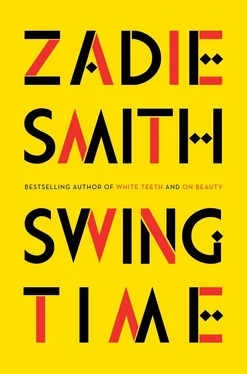“I see my job this way,” said Fern firmly, as the kettle began to whistle. “I am not of her world, that’s clear. But I am here so that if she gets bored—”
“ When she gets bored—”
“My job is to make sure something of use is left here, on the ground, whatever happens, whenever she leaves.”
“I don’t know how you do it.”
“Do what?”
“Deal with the drops when you can see the ocean.”
“Another proverb! You said you hated them, but see how you’ve caught the local habit!”
“Are we having tea or what?”
“Actually, it’s easier,” he said, pouring the dark liquid into my glass. “I respect the person who can think of the ocean. My mind no longer works that way. When I was young like you, maybe, not now.”
I couldn’t tell any more if we were talking of the whole world, of the continent in general, of the village in particular, or simply of Aimee, who, for all our good intentions, all our proverbs, neither of us seemed able to think of very clearly.
• • •
Woken at five most days by the roosters and the call to prayer, I got into the habit of going back to sleep till ten or later, getting to the school in time for the second period or the third. The morning of Aimee’s arrival, though, I felt a fresh determination to see the whole day while it was still mine to enjoy. I surprised myself — and Hawa, Lamin and Fern — by appearing at eight o’clock, outside the mosque, where I knew they met each morning without me and walked together to school. The beauty of the morning was another surprise: it reminded me of my earliest experiences of America. New York was my first introduction to the possibilities of light, crashing through gaps in curtains, transforming people and sidewalks and buildings into golden icons, or black shadows, depending on where they stood in relation to the sun. But the light in front of the mosque — the light I stood in as I was greeted like a local hero, simply for rising from my bed three hours after most of the women and children I lived with — this light was something else again. It buzzed and held you in its heat, it was thick, alive with pollen and insects and birds, and because nothing higher than one story interrupted its path, it gave all its gifts at once, blessing everything equally, an explosion of simultaneous illumination.
“What do you call those birds?” I asked Lamin. “The little white ones with the blood-red beaks? They’re beautiful.”
Lamin tipped his head back and frowned.
“Those? They are just birds, not special. You think they’re beautiful? We have much more beautiful birds than that in Senegal.”
Hawa laughed: “Lamin, you begin to sound like a Nigerian! ‘You like that river? We have a much more beautiful river in Lagos.’”
Lamin’s face creased into an irresistible, shamefaced smile—“I am only telling the truth when I say we have a similar bird but bigger. It is more impressive”—and Hawa put her hands either side of her tiny waist and gave Lamin the flirtatious side-eye: I saw how it delighted him. I should have seen it before. Of course he was in love with her. Who wouldn’t be? I liked the idea, and felt vindicated. I looked forward to telling Aimee she was barking up the wrong tree.
“Well, now you sound like an American,” announced Hawa. She looked out over her village. “I think every place has its share of beauty, thanks be to God. And right here is as beautiful as any place I know.” A beat later, though, a new emotion passed over her pretty face, and when I looked over to where she seemed to be looking I saw a young man standing by the UN fresh well-water project, washing his arms up to the elbow, and glancing over at us with an equally pensive look. It was clear that these two represented a kind of provocation to each other. As we got closer I recognized that he belonged to a type I’d seen before here and there, on the ferry, walking along the highways, often in the city but rarely in the village. He had a bushy beard and a white turban tied loosely round his head, he carried a raffia pack on his back and his trousers were oddly cut, several inches above the ankle. As Hawa ran ahead of us to greet him I asked Lamin who he was.
“It is her cousin Musa,” said Lamin, returning to his usual whisper, now laced with acid disapproval. “It is unfortunate we meet him here. You must not bother with him. He was a bumster and now he is a mashala , he is a trouble to his family, and you must not bother with him.” But when we reached Hawa and her cousin, Lamin greeted him with respect and even a little awkwardness, and I noticed Hawa, too, seemed shy of him — as if he were an elder rather than not much more than a boy — and remembering that her scarf had slipped to her neck she now lifted it back till it covered all of her hair. Hawa introduced me to Musa politely in English. We nodded at each other. He seemed to be struggling to stabilize a certain look on his face, of benign serenity, like a visiting king from a more enlightened nation. “How are you, Hawa?” he mumbled, and she, who always had a lot to say on that question, outdid herself in a nervous tumble of description: she was well, her grandmothers were well, various nephews and nieces were well, the Americans were here, and well, for the school was opening tomorrow afternoon, and there was to be a big celebration, DJ Khali was playing — did he remember that time on the beach dancing to Khali? Oh, man, that was fun! — and people were coming from upriver, from Senegal, from everywhere, because it was a wonderful thing that was happening, a new school for the girls, because education is a very important thing, especially for girls. This last part was for me and I smiled to approve it. Musa nodded, a little anxiously I thought, through all of it, but now that Hawa had at last stopped he turned a little, more toward me than his cousin, and said in English: “Unfortunately I will not be there. Music and dancing is Shaytan. Like many things done around here it is aadoo , custom, not religion. In this country we dance our lives away. Everything is an excuse for dancing. Anyway, I am leaving on khuruj today to Senegal.” He looked down at the simple leather sandals he wore on his feet as if to check they were prepared for the journey ahead. “I go there for Da’wah , to invite and to call.”
At this Lamin laughed, heavily sarcastic, and Hawa’s cousin replied sharply to Lamin in Wolof — or perhaps it was Mandinka — and Lamin back to Musa, and back again, while I stood there, smiling the awkward idiot grimace of the untranslated.
“Musa, we miss you at home!” cried Hawa suddenly in English, with real feeling, hugging her cousin’s skinny left arm as if this were as much of him as she dared hug, and he nodded many times again but did not answer. I thought he might leave us here — his and Lamin’s exchange had seemed to me of the kind where someone really should leave afterward — but instead we all walked on together toward the school. Musa put his hands behind his back and began talking, in a low, quiet, pleasant stream, it sounded to me like a lecture, to which Hawa listened respectfully but which Lamin kept interrupting, with increasing energy and volume, in a style I couldn’t recognize as his. With me he would wait till I finished each sentence, and leave long gaps of silence before he replied, silences I came to think of as conversational graveyards, where anything awkward or unpleasant I might have presented to him was sent to be buried. This angry, confrontational Lamin was so alien to me that I felt as if he, Lamin, would not want me to see him in action. I picked up my pace a little, and when I was several yards ahead of them all I turned round to see what was going on and saw that they, too, had stopped. Musa had Lamin’s wrist in his hand: he was pointing to his big broken watch and saying something very solemn. Lamin snatched his arm back, and seemed to sulk, and Musa smiled as if all this had been very pleasant, or at least necessary, shook Lamin’s hand despite their apparent dispute, accepted another hug of his arm from Hawa, nodded at me across the way, and turned back the way he had come.
Читать дальше












